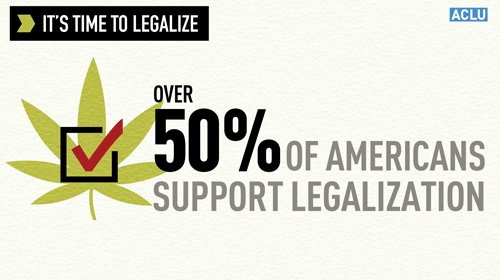
The cover of a recent issue of The Nation calling for marijuana legalization features President Obama with his high school buddies, known as the Choom Gang, who, allegedly, were very into smoking weed. And as The Nation points out, Obama has company—Presidents Bill Clinton and George W. Bush before him both admitted to using drugs.
How is it, then, that we continue to enforce our marijuana criminal laws with serious consequences for some American youth despite the fact that the last three presidents all used drugs?
The fact is that our commander-in-chiefs' success stories are a far cry from the reality for thousands of people who are needlessly swept into the criminal justice system for using marijuana. These young people face serious – sometimes-lifelong – negative consequences affecting eligibility for financial aid, public housing, and employment opportunities.
And despite a recent Gallup poll showing the majority of Americans now support legalizing marijuana, the War on Marijuana rages on, hitting communities of color the hardest. Last June, the ACLU published a report found that Blacks are 3.73 times more likely to be arrested for marijuana possession than whites—despite comparable usage rates. Racial disparities in marijuana possession arrests exist in every state in the country (with the exception of Hawaii—the Choom Gang's home base) and D.C..
In a feature article in the Nation's marijuana issue, Professor Harry Levine explains how these staggering racial disparities in arrest rates exist for an activity Blacks and whites partake in with comparable frequency. Throughout the country, police concentrate patrols in communities of color. Once there, cars and people are often stopped without reasonable suspicion or searched without probable cause, pockets are turned inside out, and inevitably the police find marijuana. Meanwhile, police don't patrol white communities with the same indifference to the Constitution, particularly middle- and upper- class neighborhoods. So while Black marijuana possession is criminalized, "most well-off whites enjoy a de facto legalization of marijuana possession."
While legalizing marijuana would not resolve the deep racial bias that infects our criminal justice system at every stage, it would end the racially disparate enforcement of marijuana laws, bring fewer people of color into unnecessary contact with the criminal justice system, reduce the number of young people with unwarranted criminal records, and allow law enforcement to focus its resources on serious crime. It would also allow for a fiscally sound approach that taxes and regulates marijuana – cutting gangs and cartels out of the profit stream while generating much-needed revenue for investment in public schools, infrastructure, and drug treatment. No longer cast as a criminal justice issue, marijuana would be properly treated as a public health issue.
It is time to end marijuana policies that derail so many young people's lives and to focus on getting their lives on the right track instead.
Learn more about marijuana law reform and other civil liberty issues: Sign up for breaking news alerts, follow us on Twitter, and like us on Facebook.

